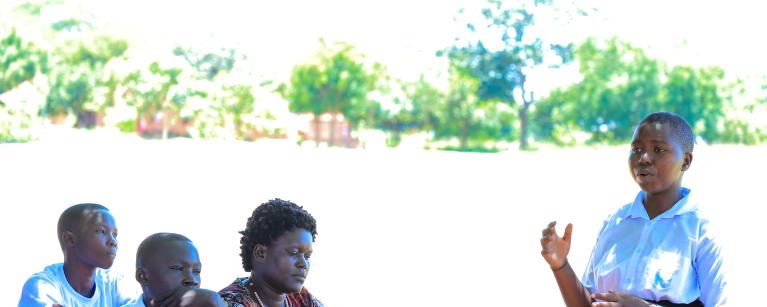For Joan Kisakye, the change of environment from Kampala to Ocea where she would enroll into Rhino Camp Secondary School was a change that she initially struggled with.
According to her teacher, Mildred Nyakuru, “she was reserved who didn’t socialize freely with her fellow students and wasn’t able to consult teachers which affected her grades.”
Kisakye’s woes were made much worse by a disillusionment with her future and inability to understand what the future held in store for her as she continued to grow.
“I was confused, in a dilemma and didn’t know what was next for me, so I had lost my self-esteem and didn’t think I would ever become someone.”
Femme Forte Peer Educators Club
In 2022, as schools reopened in the aftermath of the COVID19 pandemic which had led to an increase in teenage pregnancies across the West Nile region, Femme Forte working with CEHURD and Oxfam under the Stand Up for Sexual Reproductive Health Rights (SRHR) project introduced a Health club at Rhino Camp High School.
Under the initiative, Femme Forte trained 10 girls and boys on several health-related issues including, life skills, growth and development, reusable sanitary pad making, and personal hygiene among others.
It was the activities of the club that first peaked Kisakye’s interest in making inquiries.
“I saw them regularly cleaning the school compound, burning the girls' incinerator and counselling fellow students and I was interested and approached one of them.”
Kisakye was recruited as a change agent by Peace Echoniru, then head of peer educators and taken through the concepts of SRHR using the Izuba Manual, a simplified tool kit developed by Femme Forte that is used as a guide on SRHR.
“They taught me about growth and development, harmful gender norms and the importance of personal hygiene” says Kisakye.
It was from this that I also learnt about visualisation of the future which changed everything for me.
The “visualisation of the future” as laid out in the Izuba Manual aims to encourage youth, particularly adolescent girls and young women, to envision their aspirations and potential futures in a positive way by setting long term goals and taking actionable steps towards achieving them through creative exercises and reflection.
“I was able to think of my future more clearly and realized I wanted to become an engineer and have been working towards that goal which has made me surer of the future.”
In visualizing her future, Kisakye was able to draw from her own surroundings for inspiration.
“I’ve been seeing what other successful people do, so I feel, like that's where I want to be and one of the people, I admire is my uncle who is an electrical engineer” she says.
With newfound confidence Kisakye has taken on more roles within the club and was elected to a leadership position within the club.
“She was committed as a change agent and because of that she was elected as the chairperson of the Peer Educators club” says Peace Echoniru Peace
The new role has come with its own set of responsibilities and Kisakye has had to adapt and lead the charge in promoting SHRH.
“Every Monday we organise general cleaning of the compound and we are able to bring both girls and boys together to promote health”
The peer educators also educate girls, on how to make and maintain reusable pads, menstrual health management and hygiene, preventing Sexually Transmitted diseases and personal hygiene.
Confidentiality as a Tool to further
Among the skills that were taught to Kisakye as a change agent was confidentiality, as a way of building confidence to allow students open up with their issues and questions.
For many students, discussing SRHR issues including menstrual hygiene management has been a difficulty but with the assurance of confidentiality, Kisakye is able to reach out to her fellow students.
“When they talk and share something, they do so with the knowledge that It will remain a secret because I promise them that I’ll not tell anybody and I always do that.”
In observing confidentiality, the peer educators and change agents have become go-to persons for advise and information not only on SRHR but also on education.
“On some days, I am approached by atleast three students who open up to be about issues affecting them and where the issue is beyond me, I refer them to the Senior Woman teacher who is the patron of our club.”
In the past any conversations about sexual rights have been met with scorn and disdain but through continued sensitisation, Kisakye hopes that she can bring awareness to issues like Menstrual hygiene management to ensure that girls are able to attend school.
“I want to see that girls attend school without any interruptions to allow them become great people.” She says.
